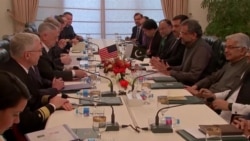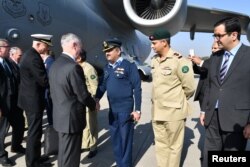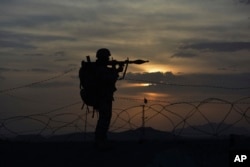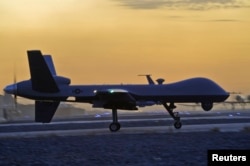U.S. Secretary of Defense Jim Mattis urged Pakistan on Monday to redouble its efforts to confront militants and terrorists operating within the country, emphasizing "the vital role" Islamabad can play to work with Washington to facilitate a peace process in Afghanistan.
Mattis arrived in Pakistan on a day trip and went into meetings with Prime Minister Shahid Khaqan Abbasi and the military chief, General Qamar Javed Bajwa. Top Cabinet members and the country's spy chief, as well as national security adviser, also attended.
Mattis came away from the visit "confident and optimistic," according to a senior U.S. defense official who characterized the meetings as "straightforward" and "focused on rebuilding trust."
"Rather than present a list of charges," Mattis focused on finding common ground, the official said. "The secretary has too much respect for Pakistan's military to believe they can't or won't" address U.S. concerns about militants, he added.
A U.S. statement issued after the talks said Mattis recognized Pakistan's sacrifices in the war against terrorism and called for increased efforts toward regional stability and security.
"The Secretary emphasized the vital role that Pakistan can play in working with the United States and others to facilitate a peace process in Afghanistan that brings stability and security to the region," it said.
U.S. and Afghan officials allege the Taliban and the Haqqani Network are using sanctuaries on Pakistani soil for orchestrating attacks on the Afghan side of the border.
'Committed to its resolve'
Abbasi's office also issued its own statement that quoted the prime minister as telling Mattis that counterterrorism operations have improved national security and Pakistan would continue the campaign to consolidate the gains it has achieved over the past four years.
"The Prime Minister reiterated that there are no safe heavens in Pakistan and the entire nation was committed to its resolve on eradicating terrorism once and for all in all its forms and manifestations," it said.
Earlier, Abbasi, while opening the meeting with Mattis, said "nobody wants peace in Afghanistan more than Pakistan." He added that the United States and Pakistan "share the same common objectives."
Before his visit to Islamabad, Mattis said he did not plan to "prod" Pakistan, but expected it to adhere to its promises to combat terrorism. He also expressed hope for a collaborative approach.
"I believe that we [can] work hard on finding common ground and then we work together," Mattis said.
In October, Mattis warned the United States is willing to work "one more time" with Pakistan before taking "whatever steps are necessary" to address its alleged support for militants.
Islamabad denies supporting militants, saying Washington is scapegoating Pakistan for its own failures in Afghanistan, where the United States remains in a stalemate after 16 years of war.
Tougher stance
Before Mattis' visit, other Trump administration officials took a harder public stance on Pakistan.
Speaking at a defense forum Saturday, CIA Director Mike Pompeo said, "We are going to do everything we can to ensure that safe havens no longer exist," if Pakistan does not heed the U.S. message on militants.
Since 2004, the CIA has conducted drone strikes — mostly against al-Qaida and Pakistani Taliban targets — in northwest Pakistan, near the border with Afghanistan.
The United States is considering expanding those strikes, along with several other measures, according to media reports.
Other options include downgrading Pakistan's status as a major non-NATO ally or sanctioning individual Pakistani leaders suspected having ties with the Taliban.
But any kind of punitive action wouldn't take place for at least a few weeks at minimum, predicts Michael Kugelman, a South Asia analyst with the Woodrow Wilson Center.
"I think [the administration] wants to give the Pakistanis a bit more time to see if they're responding to the various demands the United States made of them when it comes to cracking down on terrorists," said Kugelman.
One of the likelier U.S. responses, according to Kugelman, is expanding not only the geographic scope of the drone war, but also widening the type of targets the United States goes after.
"I think we could start seeing the U.S. trying to target more Haqqani Network and Afghan Taliban targets," especially in the sparsely populated Baluchistan and Khyber Pakhtunkhwa provinces, he said.
The Trump administration has also threatened cut off aid to Pakistan. Since 2002, the United States has given over $33 billion in assistance to Pakistan. But the aid has already been cut sharply in recent years.
Pakistani leverage?
If ties were to deteriorate, the United States also has much to lose. Pakistan controls U.S. military supply routes to landlocked Afghanistan, and could close them down, as they did in 2011. The United States would also like Pakistan to scale back its nuclear modernization, improve ties with India, and stay engaged in the broader fight against Islamic militants.
But despite the risks, Michael O'Hanlon, a senior fellow at the Brookings Institution, warns Washington appears to be running out of patience.
"For many years we were trying to hold out hope that the Pakistanis would change their mind about Afghanistan and our role there," he said. "But those kinds of hopes aren't as prevalent anymore. And on balance, therefore, I think we are closer to using some of those tougher methods."
Mattis, who is on a regional tour that also took him to Egypt, Jordan and Kuwait, wouldn't elaborate on timing for any possible U.S. action.
However, following the meetings, a U.S. defense official warned: "Our patience is not unlimited."














